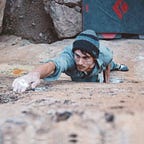Overtraining
Pernicious, counterproductive, and oh-so-easy to fall victim to —overtraining is the achilles heel of any serious athlete.
I’ve struggled with overtraining in the past: I used to think that if I climbed more, I’d get stronger. But that’s wrong! Past a certain point, additional training will cause you to plateau or even make you weaker.
But the other side of the coin is that under-training will also make you weaker, due to the so-called “detraining” effect. So how do you strike the perfect balance between under- and over-training, growing forever stronger and developing the crushing indomitable grip of steel that can onsight 5.16a for breakfast? With science, of course!
Supercompensation is a battle-tested theory that’s been kicking around in sports science since the 1950’s. It’s foundational — one of the closest things to an ‘absolute truth’ in sports science, and you’d be hard pressed to find a coach who disagreed with it.
It has been talked about extensively in many a scholarly article, but I’m going to break it down for you in one sentence:
When you train, you get weaker for a while, then you get stronger, and eventually you settle back to where you were.
Simple, right? Your body responds to training by becoming weaker (because you’ve damaged your muscle fibers, taxed your central nervous system, etc). Assuming you do a good job of replenishing your energy stores, getting adequate sleep, eating right and so forth, then your body will re-establish homeostasis, and actually become stronger than it was before. Your body is amazingly adept: it will “supercompensate” in anticipation of future workloads. Here’s a graph that illustrates this phenomenon:
If you are clever, you will time your subsequent training session to occur at the peak of your supercompensation curve, leveraging your strength gains to achieve a new best, and dive into the next repetition of the same cycle. Here’s a quote making it more concrete:
In supercompensation the athlete can handle the same training load or a greater load with ease in the subsequent workouts if recovery is adequate and the new stress is timed properly. This adaptive phenomenon is an ongoing wavelike process. If all the variables are manipulated correctly and the proper ratio of work to recovery is achieved, the result is a continually rising sinusoidal curve pointed toward higher-level performance. — Vernon Gambetta
If you are not so clever, you will train at the nadir of your recovery curve (when your body is still reconstituting itself), and end up making yourself weaker than you were before. The worst part is, lots of people actually do this, and most of them don’t even know it! This is how overtraining happens, in a nutshell. It’s simply training again too early, and not getting adequate rest.
The recovery window varies based on the sport. Typically, it takes 24–72 hours to recover from a strength training session. Moderate cardio may take less, but it depends on the volume. The best thing you can do is track your training and try to find patterns — everyone will respond differently. Another thing you can do is learn to recognize the signs of overtraining, which leads us to our next section.
Avoiding overtraining is vitally important to becoming a beast. Here are some easy signs to look for that will help you assess whether you’re adequately rested — ie, whether your body is ready to accept new training load.
Resting Heart Rate
An elevated heart rate at rest is a key sign of overtraining. How do you know it’s elevated? It’s all relative to you personally, so you must track it over time and look for irregularities. Measure it in the morning. Spending 1 minute in the morning to read your heart rate can save you hours of wasted time, training when you have no business doing so.
Persistent Soreness
Soreness lasting 3+ days is not normal, and indicates that you’re overtraining or your diet is out of whack.
Lack of Motivation
You wake up and you’re just not psyched. You have no particular desire to climb, and you begin to question the point of it all. You drag yourself out to the gym anyway, and have a mediocre session. Sound familiar? I’ve definitely done it. Let me tell you now — there is no point in climbing when you feel like this. It indicates that your body is still recovering, probably because you haven’t been diligent enough in avoiding overtraining. There is a strong connection between mind and body, and your level of motivation is a great litmus test for whether you should train or not.
Climbing “Hangover”
You climb hard, and wake up the next day feeling a sort of “hangover”, even though you didn’t drink. You feel woozy, really tired even though you got good sleep, and it doesn’t make any sense. My advice: take a day or two off.
Persistent Sickness, Dull Headache, etc.
It’s well known that overtraining lowers your immune system. Symptoms of sickness that last longer than they should, even cuts that take longer than normal to heal, may be signs of overtraining.
Hope you enjoyed the article! Hit me up on the associated Facebook post if you have comments / questions about the article: https://www.facebook.com/gabrielsilk/posts/10101636698629831
